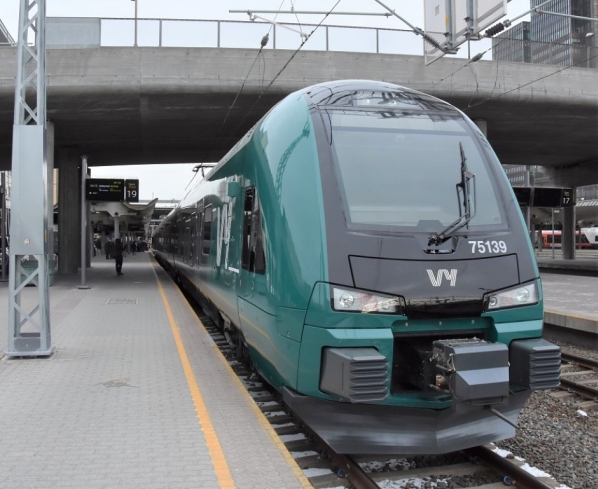NORWAY’S Vy Group has reported an operating loss of NKr 781m ($US 91.8m) in 2020, compared with an operating profit of NKr 808m in 2019.
Vy says the loss is primarily due to a collapse in demand for its services because of nationwide restrictions in response to the Covid-19 pandemic. The operator registered a 50% reduction in the number of journeys taken on its trains during the year, as well as a 59% fall in journeys on express buses.
However, Vy also reported that punctuality of services was 90.5% in 2020, alongside a rise in customer satisfaction in Norway and stable high satisfaction levels on its services in Sweden.
Vy also won and began operation of several new operating contracts in both Norway and Sweden in 2020, most notably the launch of light rail services in December on a new 5.5km line in Lund, Sweden. It trialled a new occasional commuter ticket offer called Smartpris for journeys between Moss and Oslo Central in eastern Norway, in response to expectations that commuter numbers will not return to post-pandemic levels due to teleworking.
Vy’s tourism businesses, such as Flåm Utvikling, which operates tourist services on the Flåm Line, have been especially hard-hit due to international travel restrictions. Traffic on the Flåm Line fell by 84%, with an increase in domestic passengers only partially compensating for the fall in foreign tourists.
Tourist services are also a low priority for financial support from the Norwegian Railway Directorate. Vy says that it expects to also see fewer international tourists in 2021 but predicts that the market will return in the longer term.
“In addition, we have launched new travel offers, such as the combined train and bus offer between Oslo and Trondheim, with switching between train and bus in Lillehammer,” says Vy CEO, Ms Gro Bakstad.
Freight
Vy’s freight operations were impacted to a lesser extent by the pandemic. Growing demand was reported for the transport of groceries and packages, but demand for the transport of timber, cars and aviation fuel dropped sharply. However, freight train punctuality was historically high at 96%.
Freight subsidiary CargoNet introduced a new service for food transport between Trondheim to Bodø, and for fish between Narvik and Malmö, Sweden.
“While CargoNet works to reduce costs, the state contributes to the transfer of goods from road to rail through environmental subsidies,” says Bakstad.
Further financial support
Vy also reported that despite the implementation of measures to maintain operations and reduce the financial impact of the pandemic, the company is still reliant on state support.
Vy Group entered into a new NKr 650m supplementary agreement alongside other Norwegian operators with the Norwegian Railway Directorate in January to support the continuation of its critical train services. The current agreement is scheduled to run until April, with an additional NKr 100m currently being proposed by the government. Under the agreement, Vy and other Norwegian rail operators will scale down their train services until Easter, or until travel restrictions are eased.
Vy says that it remains optimistic that vaccination efforts will reduce the consequences of the pandemic in 2021 and it is preparing for a gradual return to normality.

